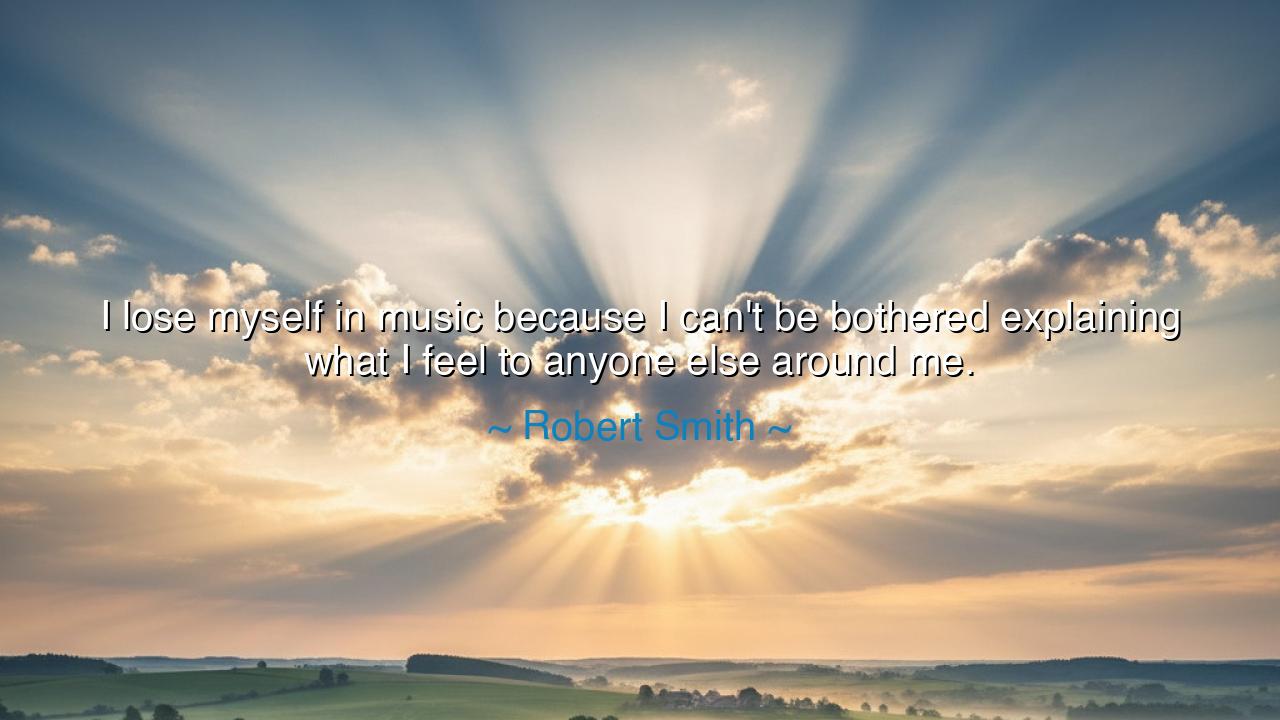
I lose myself in music because I can't be bothered explaining
I lose myself in music because I can't be bothered explaining what I feel to anyone else around me.






Hear, O child of tomorrow, the words of Robert Smith, a poet of shadows and a singer of hidden hearts: “I lose myself in music because I can’t be bothered explaining what I feel to anyone else around me.” Though born in the modern age, these words carry the weight of timeless truth. They speak of the sacred refuge of music, where the soul may wander free, unchained by the stumbling tongue and unburdened by the misunderstanding of others. For there are feelings too vast, too deep, too strange for common speech—emotions that only melody can carry across the abyss between the heart and the world.
The first truth here is in the phrase: “I lose myself in music.” To lose oneself is not to perish, but to be immersed, to dissolve the boundaries of ego and thought until one is no longer separate from the song. In that moment, the listener becomes the note, the rhythm, the rising swell of sound. Just as mystics lose themselves in prayer, or lovers in the gaze of each other, so too the artist loses himself in the infinite sea of music. In this surrender, there is freedom, for the burdens of daily life fall silent, and the soul communes with something greater than words.
The second truth lies in his lament: “I can’t be bothered explaining what I feel.” Here speaks the weariness of one who knows that words often betray us. Language, though mighty, is limited. To describe sorrow, joy, or longing in mere syllables is like trying to catch the ocean in a cup. The poet and the singer know this: the heart speaks in colors, in sounds, in silence more eloquent than speech. Thus, music becomes the chosen tongue of the ineffable. It says what cannot be said, it explains what cannot be explained, and it carries the listener into a realm beyond argument or doubt.
Consider, as a mirror of this truth, the tale of Beethoven. As deafness stole from him the world of spoken sound, he turned deeper inward, to that place where music was born. Though he could not hear as men hear, he poured his feelings into symphonies that shook the heavens. Did he explain his despair to friends? No, he wove it into the dark thunder of his Fifth Symphony. Did he articulate his joy in words? No, he let the “Ode to Joy” proclaim it to the world. Like Robert Smith, Beethoven knew that the deepest rivers of the soul do not flow into language, but into the music that transcends it.
What lesson, then, shall the seeker draw from this? It is this: when words fail, let your spirit find its refuge in creation. Whether through music, art, writing, or silence, do not be trapped by the prison of speech when your heart longs for a greater vessel. For some, it is the pen; for others, the brush or the instrument. But whatever your art, it may carry you farther than words alone. The greatest truths are often sung, painted, or whispered through notes that only the soul can hear.
Therefore, take practical steps: when overwhelmed, do not always strive to explain. Instead, pick up the instrument, open the notebook, sing aloud, or simply immerse yourself in the songs that move you. Let them hold you when others cannot. Do not despair if no one understands your feelings in words—let them understand through the music you live by. In this way, your emotions are not buried, but transformed, becoming bridges of beauty to others who wander in the same silence.
Remember this: to lose yourself in music is not escape, but a return—to the truth of who you are, unfiltered, unguarded, alive. And when the world demands explanations you cannot give, offer instead the song of your heart. For in that melody lies both your freedom and your gift to the generations yet to come.
Thus let the words of Robert Smith echo like a psalm for the weary: “I lose myself in music because I can’t be bothered explaining what I feel to anyone else around me.” May you, too, find such a refuge, and may you pass it forward, so that all who cannot speak their truth may yet sing it.






AAdministratorAdministrator
Welcome, honored guests. Please leave a comment, we will respond soon